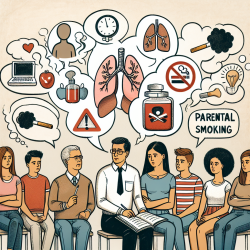Introduction
The research article "Youth’s narratives about family members smoking: parenting the parent- it’s not fair!" by Woodgate and Kreklewetz (2012) provides valuable insights into how youth perceive parental smoking and its impact on family dynamics. This blog explores how practitioners can leverage these findings to enhance their skills and encourage further research in the field.
Key Findings
The study involved 75 Canadian youth aged 11-19, revealing several key themes:
- It's Not Fair: Youth perceive smoking around children as unjust, struggling to understand why parents would expose them to such risks.
- Parenting the Parent: Youth often find themselves educating their parents about the dangers of smoking, reversing traditional roles.
- The Good/Bad Parent Dichotomy: Non-smoking parents are viewed as responsible, while smoking parents are seen as neglectful.
- Distancing Relationships: Smoking creates emotional and physical distance between youth and their family members.
- The Prisoner Effect: Youth feel trapped in environments where they are exposed to second-hand smoke, leading to feelings of helplessness.
Implications for Practitioners
Practitioners working with youth can implement the study's findings in several ways:
- Encourage Open Communication: Facilitate discussions where youth can express their concerns about parental smoking in a safe environment.
- Empower Youth: Provide youth with resources and strategies to communicate effectively with their parents about smoking.
- Support Emotional Well-being: Recognize the emotional toll of second-hand smoke exposure and offer counseling or support groups.
- Advocate for Smoke-Free Environments: Work with schools and communities to promote smoke-free policies in homes and public spaces.
Encouraging Further Research
The study highlights the need for further research into the emotional and health impacts of second-hand smoke on youth. Practitioners can contribute by:
- Collaborating with Researchers: Partner with academic institutions to study the long-term effects of parental smoking on youth.
- Participating in Conferences: Share insights and experiences at professional gatherings to raise awareness and inspire new research initiatives.
Conclusion
Understanding youth perspectives on parental smoking is crucial for developing effective interventions and support systems. By applying the findings of this study, practitioners can better support youth in navigating the challenges posed by second-hand smoke exposure.
To read the original research paper, please follow this link: Youth’s narratives about family members smoking: parenting the parent- it’s not fair!










